CG2001: Exploring the Development of the Unconscious in Britain
VerifiedAdded on 2019/09/20
|10
|3625
|161
Essay
AI Summary
This essay critically analyzes the psychoanalytic theories of Melanie Klein and D.W. Winnicott, focusing on the development of the unconscious mind. It explores key concepts such as Klein's theories on unconscious phantasies, the paranoid-schizoid and depressive positions, and the impact of early childhood relationships on mental models. The essay also examines Winnicott's contributions, including the concepts of the 'true self,' 'false self,' 'the good enough mother,' and transitional objects, alongside his stages of dependence and the significance of play and creativity. The essay also considers the role of projective identification, part-object versus whole-object relationships, and the interplay of life and death instincts. The essay concludes by highlighting the impact of these theories on understanding child development and human psychology, drawing on relevant sources and perspectives. This essay, like many others, is available on Desklib, a platform for students to find past papers and solved assignments.
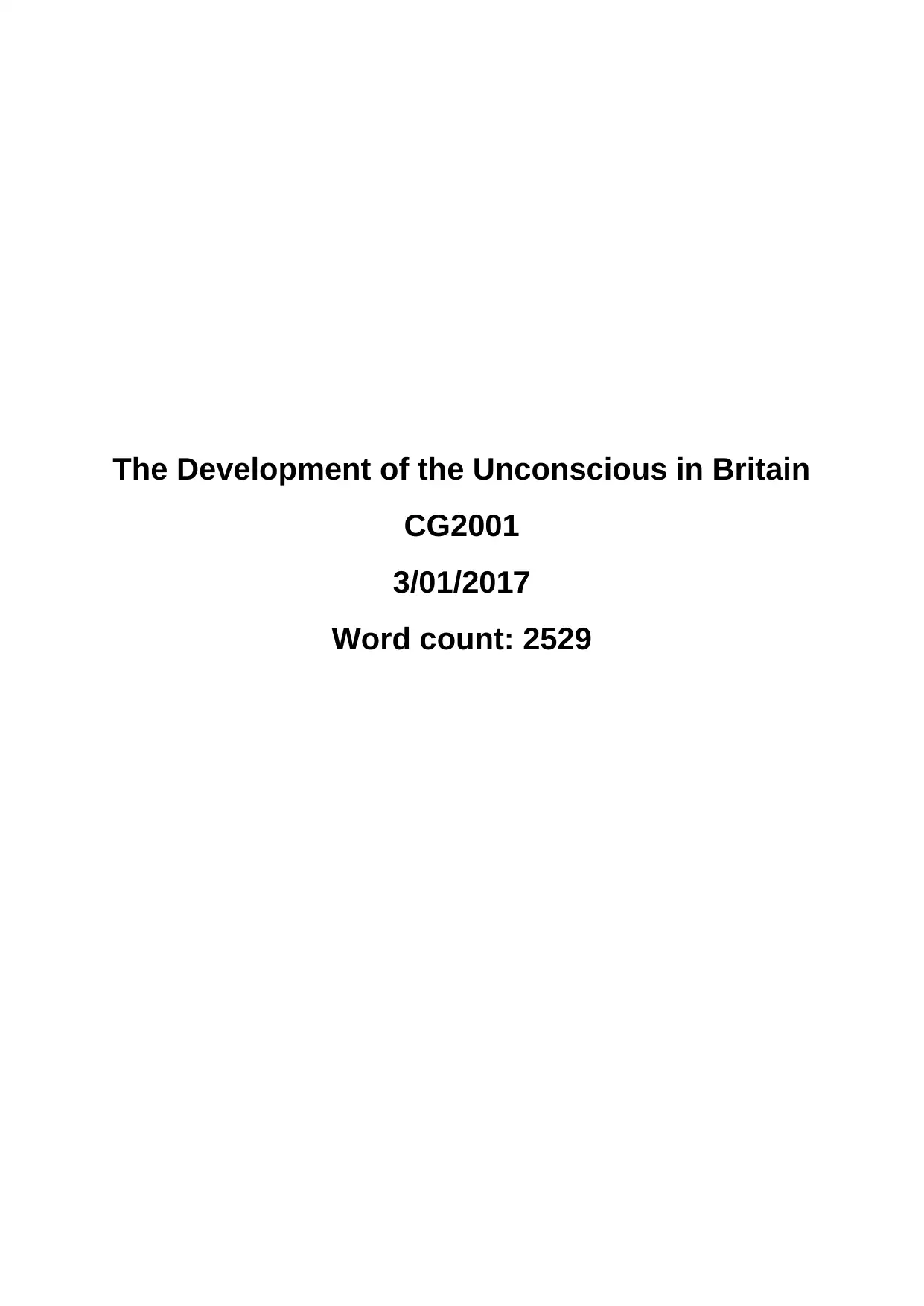
The Development of the Unconscious in Britain
CG2001
3/01/2017
Word count: 2529
CG2001
3/01/2017
Word count: 2529
Paraphrase This Document
Need a fresh take? Get an instant paraphrase of this document with our AI Paraphraser
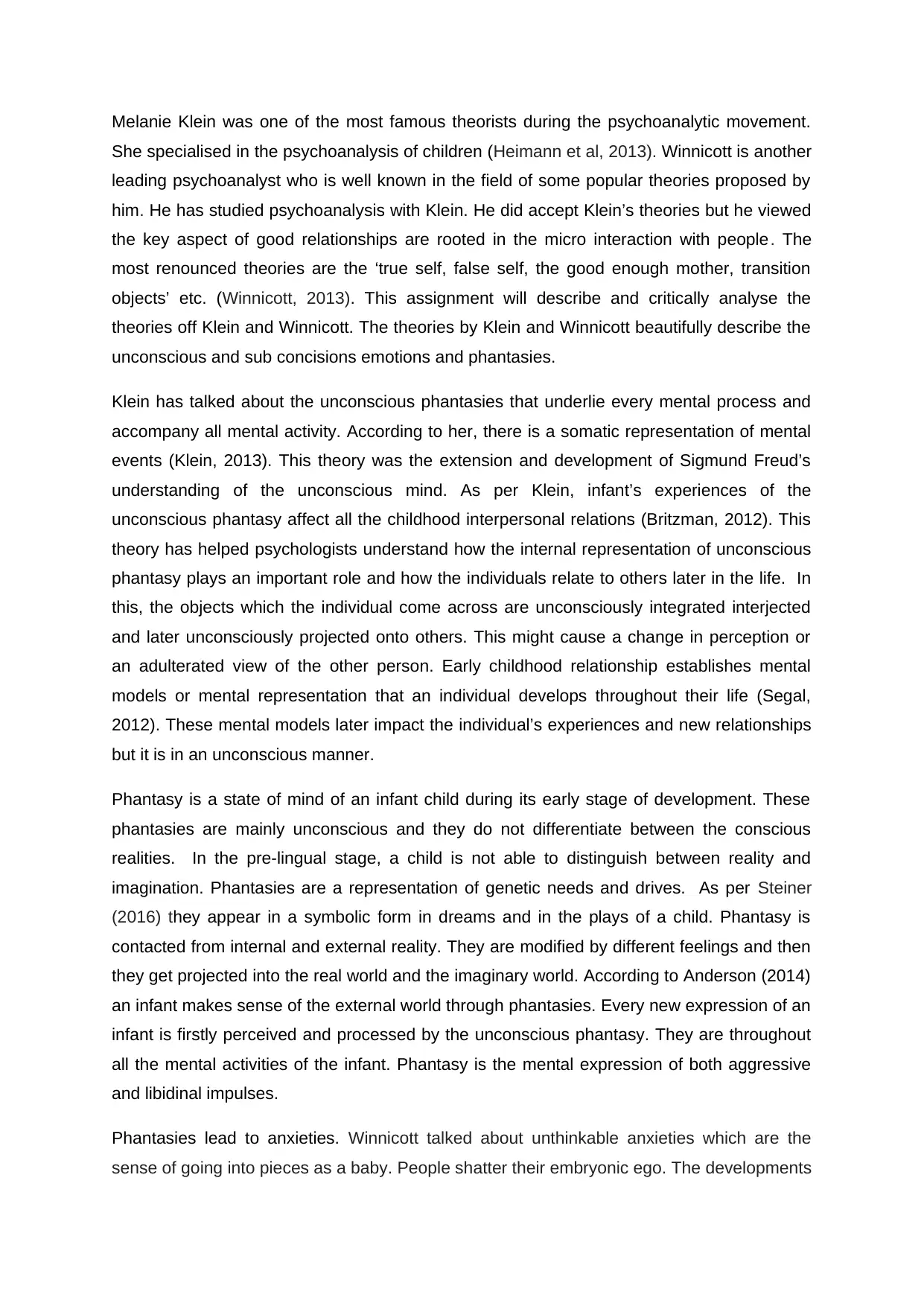
Melanie Klein was one of the most famous theorists during the psychoanalytic movement.
She specialised in the psychoanalysis of children (Heimann et al, 2013). Winnicott is another
leading psychoanalyst who is well known in the field of some popular theories proposed by
him. He has studied psychoanalysis with Klein. He did accept Klein’s theories but he viewed
the key aspect of good relationships are rooted in the micro interaction with people. The
most renounced theories are the ‘true self, false self, the good enough mother, transition
objects’ etc. (Winnicott, 2013). This assignment will describe and critically analyse the
theories off Klein and Winnicott. The theories by Klein and Winnicott beautifully describe the
unconscious and sub concisions emotions and phantasies.
Klein has talked about the unconscious phantasies that underlie every mental process and
accompany all mental activity. According to her, there is a somatic representation of mental
events (Klein, 2013). This theory was the extension and development of Sigmund Freud’s
understanding of the unconscious mind. As per Klein, infant’s experiences of the
unconscious phantasy affect all the childhood interpersonal relations (Britzman, 2012). This
theory has helped psychologists understand how the internal representation of unconscious
phantasy plays an important role and how the individuals relate to others later in the life. In
this, the objects which the individual come across are unconsciously integrated interjected
and later unconsciously projected onto others. This might cause a change in perception or
an adulterated view of the other person. Early childhood relationship establishes mental
models or mental representation that an individual develops throughout their life (Segal,
2012). These mental models later impact the individual’s experiences and new relationships
but it is in an unconscious manner.
Phantasy is a state of mind of an infant child during its early stage of development. These
phantasies are mainly unconscious and they do not differentiate between the conscious
realities. In the pre-lingual stage, a child is not able to distinguish between reality and
imagination. Phantasies are a representation of genetic needs and drives. As per Steiner
(2016) they appear in a symbolic form in dreams and in the plays of a child. Phantasy is
contacted from internal and external reality. They are modified by different feelings and then
they get projected into the real world and the imaginary world. According to Anderson (2014)
an infant makes sense of the external world through phantasies. Every new expression of an
infant is firstly perceived and processed by the unconscious phantasy. They are throughout
all the mental activities of the infant. Phantasy is the mental expression of both aggressive
and libidinal impulses.
Phantasies lead to anxieties. Winnicott talked about unthinkable anxieties which are the
sense of going into pieces as a baby. People shatter their embryonic ego. The developments
She specialised in the psychoanalysis of children (Heimann et al, 2013). Winnicott is another
leading psychoanalyst who is well known in the field of some popular theories proposed by
him. He has studied psychoanalysis with Klein. He did accept Klein’s theories but he viewed
the key aspect of good relationships are rooted in the micro interaction with people. The
most renounced theories are the ‘true self, false self, the good enough mother, transition
objects’ etc. (Winnicott, 2013). This assignment will describe and critically analyse the
theories off Klein and Winnicott. The theories by Klein and Winnicott beautifully describe the
unconscious and sub concisions emotions and phantasies.
Klein has talked about the unconscious phantasies that underlie every mental process and
accompany all mental activity. According to her, there is a somatic representation of mental
events (Klein, 2013). This theory was the extension and development of Sigmund Freud’s
understanding of the unconscious mind. As per Klein, infant’s experiences of the
unconscious phantasy affect all the childhood interpersonal relations (Britzman, 2012). This
theory has helped psychologists understand how the internal representation of unconscious
phantasy plays an important role and how the individuals relate to others later in the life. In
this, the objects which the individual come across are unconsciously integrated interjected
and later unconsciously projected onto others. This might cause a change in perception or
an adulterated view of the other person. Early childhood relationship establishes mental
models or mental representation that an individual develops throughout their life (Segal,
2012). These mental models later impact the individual’s experiences and new relationships
but it is in an unconscious manner.
Phantasy is a state of mind of an infant child during its early stage of development. These
phantasies are mainly unconscious and they do not differentiate between the conscious
realities. In the pre-lingual stage, a child is not able to distinguish between reality and
imagination. Phantasies are a representation of genetic needs and drives. As per Steiner
(2016) they appear in a symbolic form in dreams and in the plays of a child. Phantasy is
contacted from internal and external reality. They are modified by different feelings and then
they get projected into the real world and the imaginary world. According to Anderson (2014)
an infant makes sense of the external world through phantasies. Every new expression of an
infant is firstly perceived and processed by the unconscious phantasy. They are throughout
all the mental activities of the infant. Phantasy is the mental expression of both aggressive
and libidinal impulses.
Phantasies lead to anxieties. Winnicott talked about unthinkable anxieties which are the
sense of going into pieces as a baby. People shatter their embryonic ego. The developments
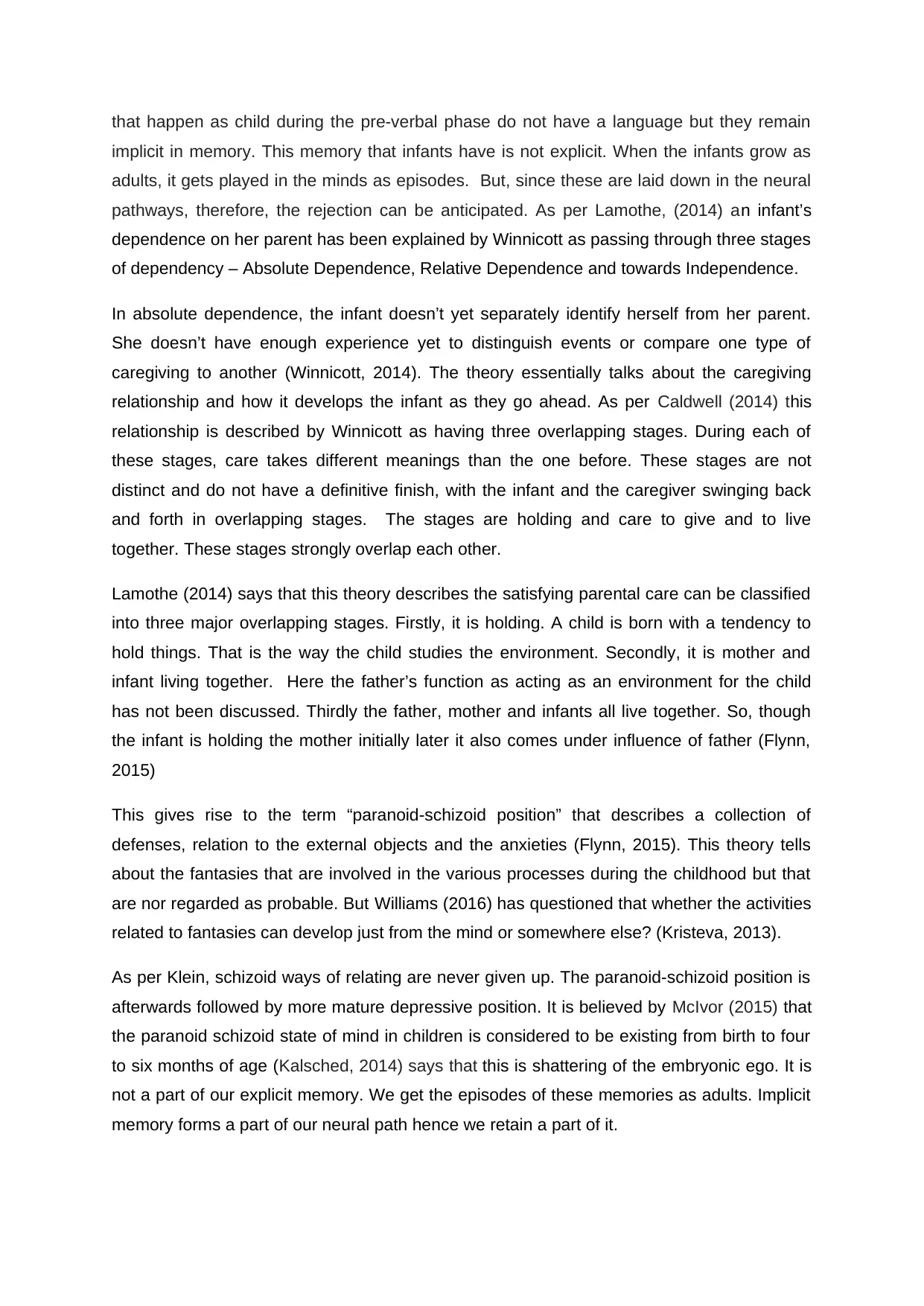
that happen as child during the pre-verbal phase do not have a language but they remain
implicit in memory. This memory that infants have is not explicit. When the infants grow as
adults, it gets played in the minds as episodes. But, since these are laid down in the neural
pathways, therefore, the rejection can be anticipated. As per Lamothe, (2014) an infant’s
dependence on her parent has been explained by Winnicott as passing through three stages
of dependency – Absolute Dependence, Relative Dependence and towards Independence.
In absolute dependence, the infant doesn’t yet separately identify herself from her parent.
She doesn’t have enough experience yet to distinguish events or compare one type of
caregiving to another (Winnicott, 2014). The theory essentially talks about the caregiving
relationship and how it develops the infant as they go ahead. As per Caldwell (2014) this
relationship is described by Winnicott as having three overlapping stages. During each of
these stages, care takes different meanings than the one before. These stages are not
distinct and do not have a definitive finish, with the infant and the caregiver swinging back
and forth in overlapping stages. The stages are holding and care to give and to live
together. These stages strongly overlap each other.
Lamothe (2014) says that this theory describes the satisfying parental care can be classified
into three major overlapping stages. Firstly, it is holding. A child is born with a tendency to
hold things. That is the way the child studies the environment. Secondly, it is mother and
infant living together. Here the father’s function as acting as an environment for the child
has not been discussed. Thirdly the father, mother and infants all live together. So, though
the infant is holding the mother initially later it also comes under influence of father (Flynn,
2015)
This gives rise to the term “paranoid-schizoid position” that describes a collection of
defenses, relation to the external objects and the anxieties (Flynn, 2015). This theory tells
about the fantasies that are involved in the various processes during the childhood but that
are nor regarded as probable. But Williams (2016) has questioned that whether the activities
related to fantasies can develop just from the mind or somewhere else? (Kristeva, 2013).
As per Klein, schizoid ways of relating are never given up. The paranoid-schizoid position is
afterwards followed by more mature depressive position. It is believed by McIvor (2015) that
the paranoid schizoid state of mind in children is considered to be existing from birth to four
to six months of age (Kalsched, 2014) says that this is shattering of the embryonic ego. It is
not a part of our explicit memory. We get the episodes of these memories as adults. Implicit
memory forms a part of our neural path hence we retain a part of it.
implicit in memory. This memory that infants have is not explicit. When the infants grow as
adults, it gets played in the minds as episodes. But, since these are laid down in the neural
pathways, therefore, the rejection can be anticipated. As per Lamothe, (2014) an infant’s
dependence on her parent has been explained by Winnicott as passing through three stages
of dependency – Absolute Dependence, Relative Dependence and towards Independence.
In absolute dependence, the infant doesn’t yet separately identify herself from her parent.
She doesn’t have enough experience yet to distinguish events or compare one type of
caregiving to another (Winnicott, 2014). The theory essentially talks about the caregiving
relationship and how it develops the infant as they go ahead. As per Caldwell (2014) this
relationship is described by Winnicott as having three overlapping stages. During each of
these stages, care takes different meanings than the one before. These stages are not
distinct and do not have a definitive finish, with the infant and the caregiver swinging back
and forth in overlapping stages. The stages are holding and care to give and to live
together. These stages strongly overlap each other.
Lamothe (2014) says that this theory describes the satisfying parental care can be classified
into three major overlapping stages. Firstly, it is holding. A child is born with a tendency to
hold things. That is the way the child studies the environment. Secondly, it is mother and
infant living together. Here the father’s function as acting as an environment for the child
has not been discussed. Thirdly the father, mother and infants all live together. So, though
the infant is holding the mother initially later it also comes under influence of father (Flynn,
2015)
This gives rise to the term “paranoid-schizoid position” that describes a collection of
defenses, relation to the external objects and the anxieties (Flynn, 2015). This theory tells
about the fantasies that are involved in the various processes during the childhood but that
are nor regarded as probable. But Williams (2016) has questioned that whether the activities
related to fantasies can develop just from the mind or somewhere else? (Kristeva, 2013).
As per Klein, schizoid ways of relating are never given up. The paranoid-schizoid position is
afterwards followed by more mature depressive position. It is believed by McIvor (2015) that
the paranoid schizoid state of mind in children is considered to be existing from birth to four
to six months of age (Kalsched, 2014) says that this is shattering of the embryonic ego. It is
not a part of our explicit memory. We get the episodes of these memories as adults. Implicit
memory forms a part of our neural path hence we retain a part of it.
⊘ This is a preview!⊘
Do you want full access?
Subscribe today to unlock all pages.

Trusted by 1+ million students worldwide
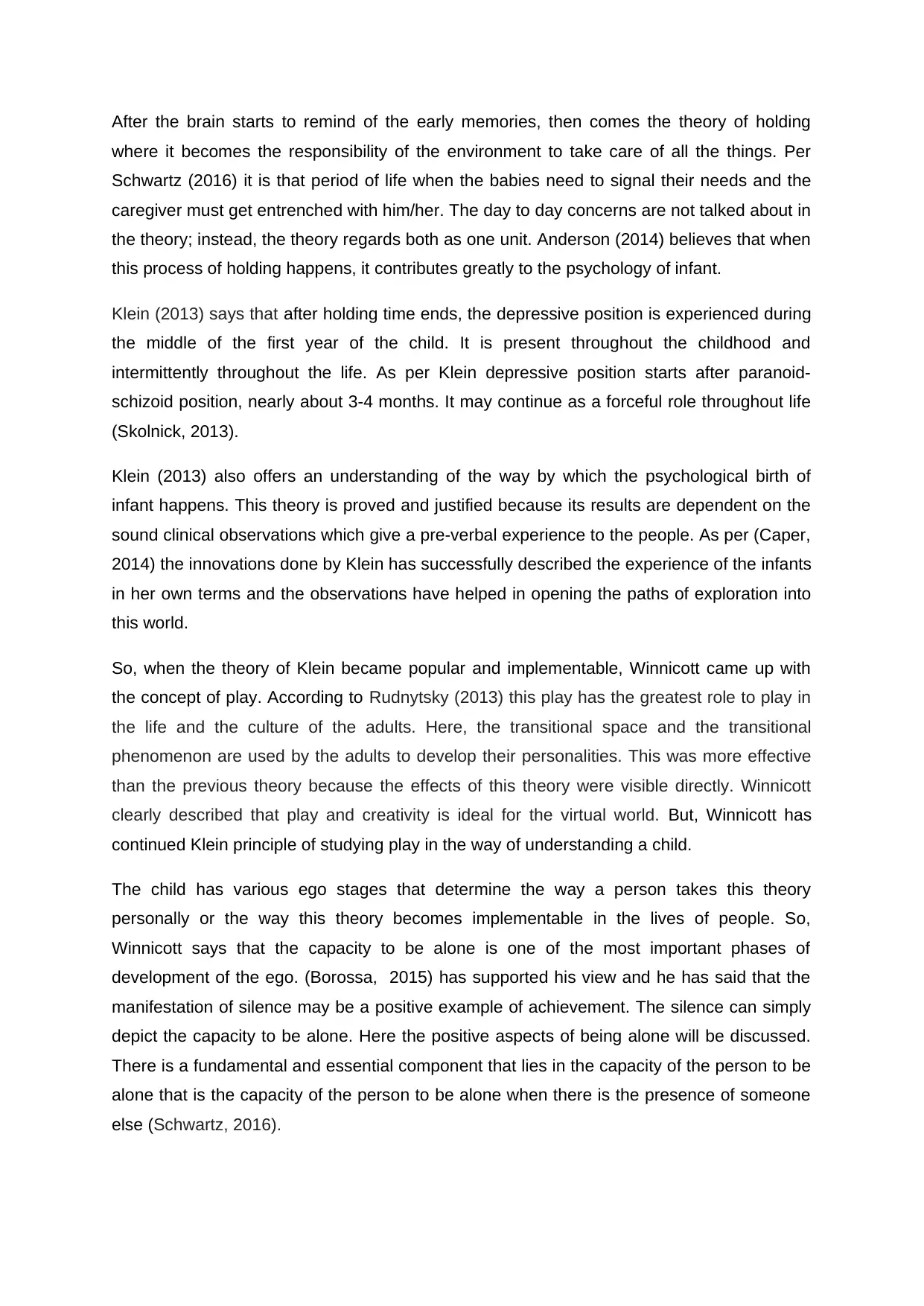
After the brain starts to remind of the early memories, then comes the theory of holding
where it becomes the responsibility of the environment to take care of all the things. Per
Schwartz (2016) it is that period of life when the babies need to signal their needs and the
caregiver must get entrenched with him/her. The day to day concerns are not talked about in
the theory; instead, the theory regards both as one unit. Anderson (2014) believes that when
this process of holding happens, it contributes greatly to the psychology of infant.
Klein (2013) says that after holding time ends, the depressive position is experienced during
the middle of the first year of the child. It is present throughout the childhood and
intermittently throughout the life. As per Klein depressive position starts after paranoid-
schizoid position, nearly about 3-4 months. It may continue as a forceful role throughout life
(Skolnick, 2013).
Klein (2013) also offers an understanding of the way by which the psychological birth of
infant happens. This theory is proved and justified because its results are dependent on the
sound clinical observations which give a pre-verbal experience to the people. As per (Caper,
2014) the innovations done by Klein has successfully described the experience of the infants
in her own terms and the observations have helped in opening the paths of exploration into
this world.
So, when the theory of Klein became popular and implementable, Winnicott came up with
the concept of play. According to Rudnytsky (2013) this play has the greatest role to play in
the life and the culture of the adults. Here, the transitional space and the transitional
phenomenon are used by the adults to develop their personalities. This was more effective
than the previous theory because the effects of this theory were visible directly. Winnicott
clearly described that play and creativity is ideal for the virtual world. But, Winnicott has
continued Klein principle of studying play in the way of understanding a child.
The child has various ego stages that determine the way a person takes this theory
personally or the way this theory becomes implementable in the lives of people. So,
Winnicott says that the capacity to be alone is one of the most important phases of
development of the ego. (Borossa, 2015) has supported his view and he has said that the
manifestation of silence may be a positive example of achievement. The silence can simply
depict the capacity to be alone. Here the positive aspects of being alone will be discussed.
There is a fundamental and essential component that lies in the capacity of the person to be
alone that is the capacity of the person to be alone when there is the presence of someone
else (Schwartz, 2016).
where it becomes the responsibility of the environment to take care of all the things. Per
Schwartz (2016) it is that period of life when the babies need to signal their needs and the
caregiver must get entrenched with him/her. The day to day concerns are not talked about in
the theory; instead, the theory regards both as one unit. Anderson (2014) believes that when
this process of holding happens, it contributes greatly to the psychology of infant.
Klein (2013) says that after holding time ends, the depressive position is experienced during
the middle of the first year of the child. It is present throughout the childhood and
intermittently throughout the life. As per Klein depressive position starts after paranoid-
schizoid position, nearly about 3-4 months. It may continue as a forceful role throughout life
(Skolnick, 2013).
Klein (2013) also offers an understanding of the way by which the psychological birth of
infant happens. This theory is proved and justified because its results are dependent on the
sound clinical observations which give a pre-verbal experience to the people. As per (Caper,
2014) the innovations done by Klein has successfully described the experience of the infants
in her own terms and the observations have helped in opening the paths of exploration into
this world.
So, when the theory of Klein became popular and implementable, Winnicott came up with
the concept of play. According to Rudnytsky (2013) this play has the greatest role to play in
the life and the culture of the adults. Here, the transitional space and the transitional
phenomenon are used by the adults to develop their personalities. This was more effective
than the previous theory because the effects of this theory were visible directly. Winnicott
clearly described that play and creativity is ideal for the virtual world. But, Winnicott has
continued Klein principle of studying play in the way of understanding a child.
The child has various ego stages that determine the way a person takes this theory
personally or the way this theory becomes implementable in the lives of people. So,
Winnicott says that the capacity to be alone is one of the most important phases of
development of the ego. (Borossa, 2015) has supported his view and he has said that the
manifestation of silence may be a positive example of achievement. The silence can simply
depict the capacity to be alone. Here the positive aspects of being alone will be discussed.
There is a fundamental and essential component that lies in the capacity of the person to be
alone that is the capacity of the person to be alone when there is the presence of someone
else (Schwartz, 2016).
Paraphrase This Document
Need a fresh take? Get an instant paraphrase of this document with our AI Paraphraser
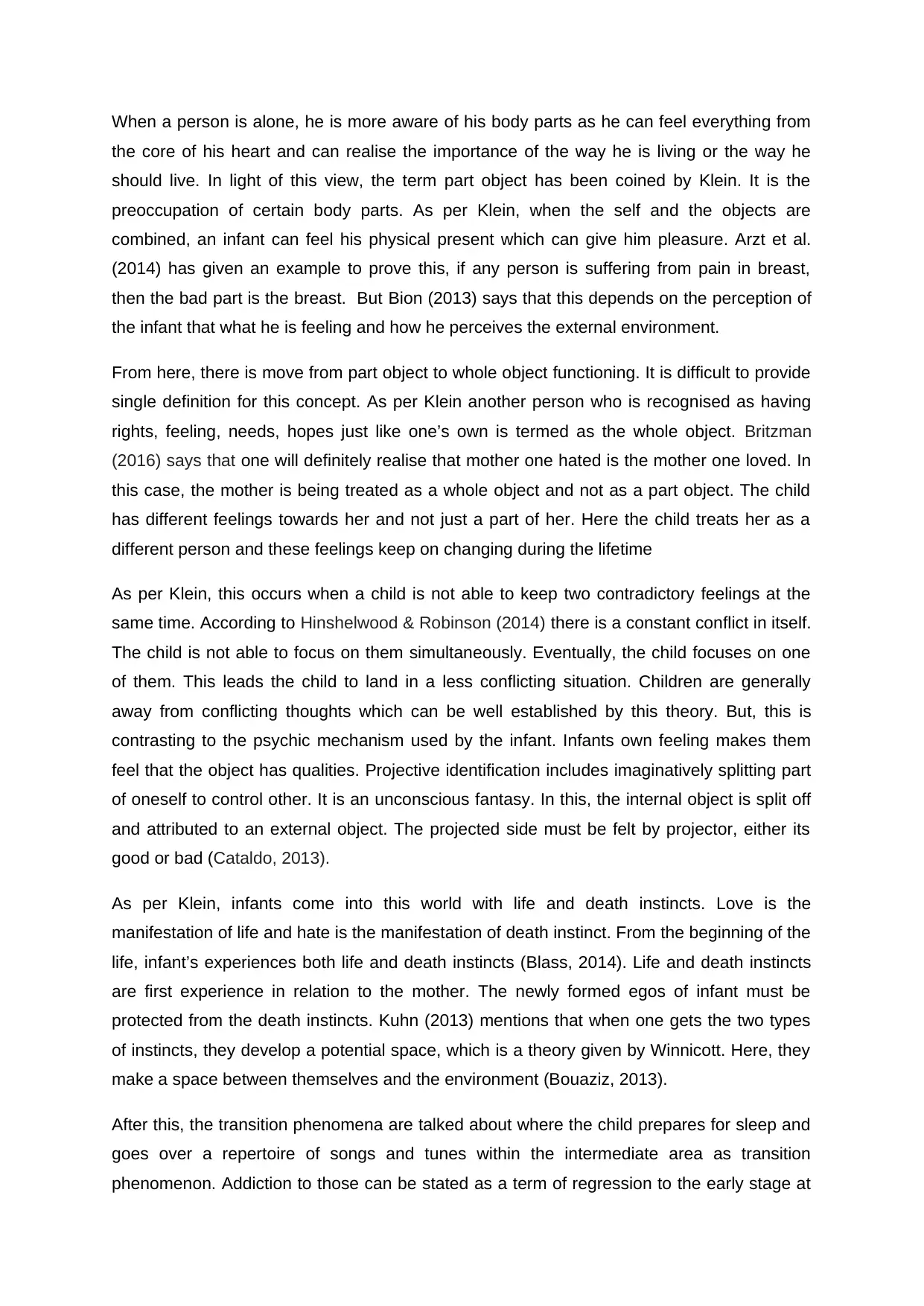
When a person is alone, he is more aware of his body parts as he can feel everything from
the core of his heart and can realise the importance of the way he is living or the way he
should live. In light of this view, the term part object has been coined by Klein. It is the
preoccupation of certain body parts. As per Klein, when the self and the objects are
combined, an infant can feel his physical present which can give him pleasure. Arzt et al.
(2014) has given an example to prove this, if any person is suffering from pain in breast,
then the bad part is the breast. But Bion (2013) says that this depends on the perception of
the infant that what he is feeling and how he perceives the external environment.
From here, there is move from part object to whole object functioning. It is difficult to provide
single definition for this concept. As per Klein another person who is recognised as having
rights, feeling, needs, hopes just like one’s own is termed as the whole object. Britzman
(2016) says that one will definitely realise that mother one hated is the mother one loved. In
this case, the mother is being treated as a whole object and not as a part object. The child
has different feelings towards her and not just a part of her. Here the child treats her as a
different person and these feelings keep on changing during the lifetime
As per Klein, this occurs when a child is not able to keep two contradictory feelings at the
same time. According to Hinshelwood & Robinson (2014) there is a constant conflict in itself.
The child is not able to focus on them simultaneously. Eventually, the child focuses on one
of them. This leads the child to land in a less conflicting situation. Children are generally
away from conflicting thoughts which can be well established by this theory. But, this is
contrasting to the psychic mechanism used by the infant. Infants own feeling makes them
feel that the object has qualities. Projective identification includes imaginatively splitting part
of oneself to control other. It is an unconscious fantasy. In this, the internal object is split off
and attributed to an external object. The projected side must be felt by projector, either its
good or bad (Cataldo, 2013).
As per Klein, infants come into this world with life and death instincts. Love is the
manifestation of life and hate is the manifestation of death instinct. From the beginning of the
life, infant’s experiences both life and death instincts (Blass, 2014). Life and death instincts
are first experience in relation to the mother. The newly formed egos of infant must be
protected from the death instincts. Kuhn (2013) mentions that when one gets the two types
of instincts, they develop a potential space, which is a theory given by Winnicott. Here, they
make a space between themselves and the environment (Bouaziz, 2013).
After this, the transition phenomena are talked about where the child prepares for sleep and
goes over a repertoire of songs and tunes within the intermediate area as transition
phenomenon. Addiction to those can be stated as a term of regression to the early stage at
the core of his heart and can realise the importance of the way he is living or the way he
should live. In light of this view, the term part object has been coined by Klein. It is the
preoccupation of certain body parts. As per Klein, when the self and the objects are
combined, an infant can feel his physical present which can give him pleasure. Arzt et al.
(2014) has given an example to prove this, if any person is suffering from pain in breast,
then the bad part is the breast. But Bion (2013) says that this depends on the perception of
the infant that what he is feeling and how he perceives the external environment.
From here, there is move from part object to whole object functioning. It is difficult to provide
single definition for this concept. As per Klein another person who is recognised as having
rights, feeling, needs, hopes just like one’s own is termed as the whole object. Britzman
(2016) says that one will definitely realise that mother one hated is the mother one loved. In
this case, the mother is being treated as a whole object and not as a part object. The child
has different feelings towards her and not just a part of her. Here the child treats her as a
different person and these feelings keep on changing during the lifetime
As per Klein, this occurs when a child is not able to keep two contradictory feelings at the
same time. According to Hinshelwood & Robinson (2014) there is a constant conflict in itself.
The child is not able to focus on them simultaneously. Eventually, the child focuses on one
of them. This leads the child to land in a less conflicting situation. Children are generally
away from conflicting thoughts which can be well established by this theory. But, this is
contrasting to the psychic mechanism used by the infant. Infants own feeling makes them
feel that the object has qualities. Projective identification includes imaginatively splitting part
of oneself to control other. It is an unconscious fantasy. In this, the internal object is split off
and attributed to an external object. The projected side must be felt by projector, either its
good or bad (Cataldo, 2013).
As per Klein, infants come into this world with life and death instincts. Love is the
manifestation of life and hate is the manifestation of death instinct. From the beginning of the
life, infant’s experiences both life and death instincts (Blass, 2014). Life and death instincts
are first experience in relation to the mother. The newly formed egos of infant must be
protected from the death instincts. Kuhn (2013) mentions that when one gets the two types
of instincts, they develop a potential space, which is a theory given by Winnicott. Here, they
make a space between themselves and the environment (Bouaziz, 2013).
After this, the transition phenomena are talked about where the child prepares for sleep and
goes over a repertoire of songs and tunes within the intermediate area as transition
phenomenon. Addiction to those can be stated as a term of regression to the early stage at
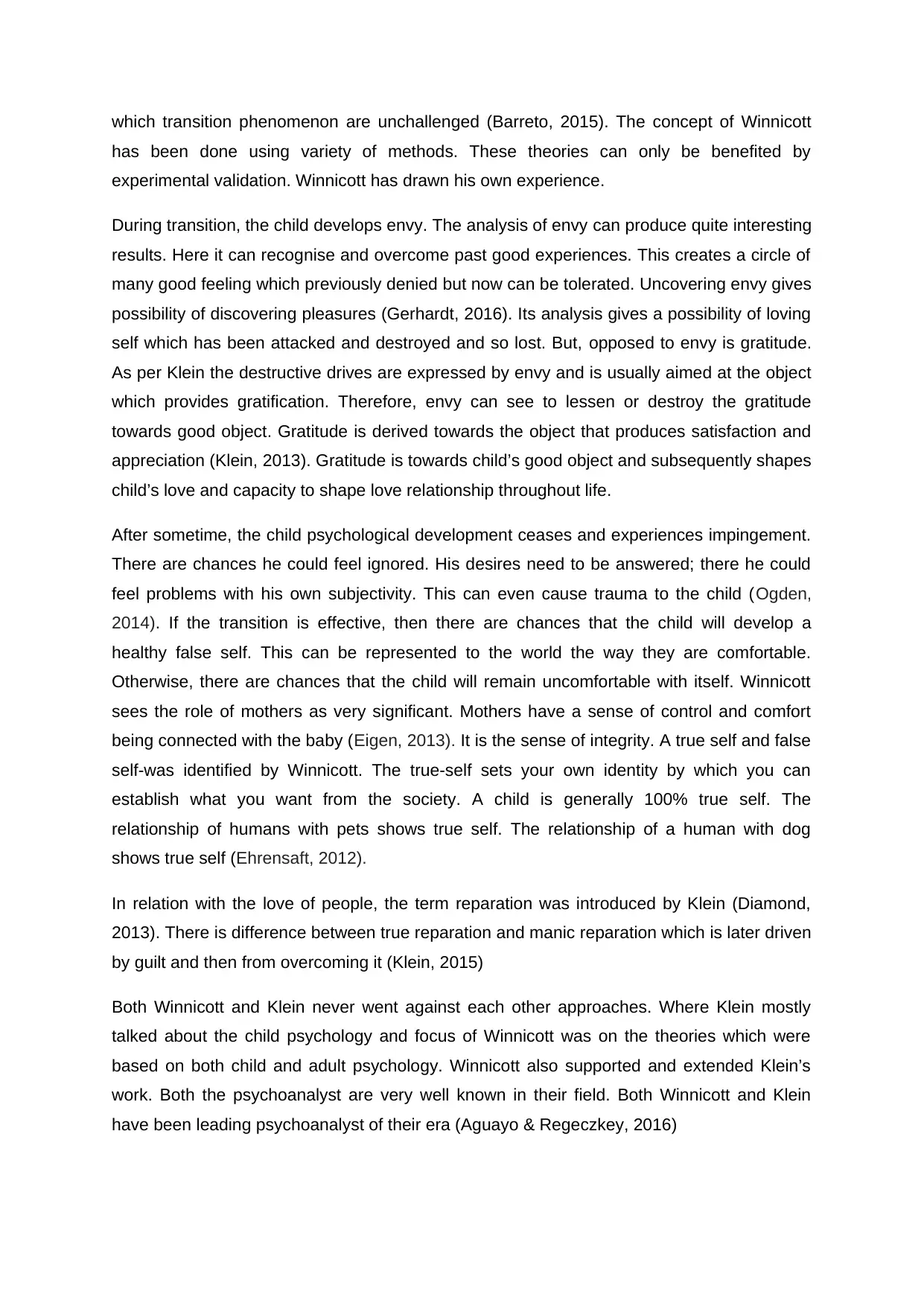
which transition phenomenon are unchallenged (Barreto, 2015). The concept of Winnicott
has been done using variety of methods. These theories can only be benefited by
experimental validation. Winnicott has drawn his own experience.
During transition, the child develops envy. The analysis of envy can produce quite interesting
results. Here it can recognise and overcome past good experiences. This creates a circle of
many good feeling which previously denied but now can be tolerated. Uncovering envy gives
possibility of discovering pleasures (Gerhardt, 2016). Its analysis gives a possibility of loving
self which has been attacked and destroyed and so lost. But, opposed to envy is gratitude.
As per Klein the destructive drives are expressed by envy and is usually aimed at the object
which provides gratification. Therefore, envy can see to lessen or destroy the gratitude
towards good object. Gratitude is derived towards the object that produces satisfaction and
appreciation (Klein, 2013). Gratitude is towards child’s good object and subsequently shapes
child’s love and capacity to shape love relationship throughout life.
After sometime, the child psychological development ceases and experiences impingement.
There are chances he could feel ignored. His desires need to be answered; there he could
feel problems with his own subjectivity. This can even cause trauma to the child (Ogden,
2014). If the transition is effective, then there are chances that the child will develop a
healthy false self. This can be represented to the world the way they are comfortable.
Otherwise, there are chances that the child will remain uncomfortable with itself. Winnicott
sees the role of mothers as very significant. Mothers have a sense of control and comfort
being connected with the baby (Eigen, 2013). It is the sense of integrity. A true self and false
self-was identified by Winnicott. The true-self sets your own identity by which you can
establish what you want from the society. A child is generally 100% true self. The
relationship of humans with pets shows true self. The relationship of a human with dog
shows true self (Ehrensaft, 2012).
In relation with the love of people, the term reparation was introduced by Klein (Diamond,
2013). There is difference between true reparation and manic reparation which is later driven
by guilt and then from overcoming it (Klein, 2015)
Both Winnicott and Klein never went against each other approaches. Where Klein mostly
talked about the child psychology and focus of Winnicott was on the theories which were
based on both child and adult psychology. Winnicott also supported and extended Klein’s
work. Both the psychoanalyst are very well known in their field. Both Winnicott and Klein
have been leading psychoanalyst of their era (Aguayo & Regeczkey, 2016)
has been done using variety of methods. These theories can only be benefited by
experimental validation. Winnicott has drawn his own experience.
During transition, the child develops envy. The analysis of envy can produce quite interesting
results. Here it can recognise and overcome past good experiences. This creates a circle of
many good feeling which previously denied but now can be tolerated. Uncovering envy gives
possibility of discovering pleasures (Gerhardt, 2016). Its analysis gives a possibility of loving
self which has been attacked and destroyed and so lost. But, opposed to envy is gratitude.
As per Klein the destructive drives are expressed by envy and is usually aimed at the object
which provides gratification. Therefore, envy can see to lessen or destroy the gratitude
towards good object. Gratitude is derived towards the object that produces satisfaction and
appreciation (Klein, 2013). Gratitude is towards child’s good object and subsequently shapes
child’s love and capacity to shape love relationship throughout life.
After sometime, the child psychological development ceases and experiences impingement.
There are chances he could feel ignored. His desires need to be answered; there he could
feel problems with his own subjectivity. This can even cause trauma to the child (Ogden,
2014). If the transition is effective, then there are chances that the child will develop a
healthy false self. This can be represented to the world the way they are comfortable.
Otherwise, there are chances that the child will remain uncomfortable with itself. Winnicott
sees the role of mothers as very significant. Mothers have a sense of control and comfort
being connected with the baby (Eigen, 2013). It is the sense of integrity. A true self and false
self-was identified by Winnicott. The true-self sets your own identity by which you can
establish what you want from the society. A child is generally 100% true self. The
relationship of humans with pets shows true self. The relationship of a human with dog
shows true self (Ehrensaft, 2012).
In relation with the love of people, the term reparation was introduced by Klein (Diamond,
2013). There is difference between true reparation and manic reparation which is later driven
by guilt and then from overcoming it (Klein, 2015)
Both Winnicott and Klein never went against each other approaches. Where Klein mostly
talked about the child psychology and focus of Winnicott was on the theories which were
based on both child and adult psychology. Winnicott also supported and extended Klein’s
work. Both the psychoanalyst are very well known in their field. Both Winnicott and Klein
have been leading psychoanalyst of their era (Aguayo & Regeczkey, 2016)
⊘ This is a preview!⊘
Do you want full access?
Subscribe today to unlock all pages.

Trusted by 1+ million students worldwide
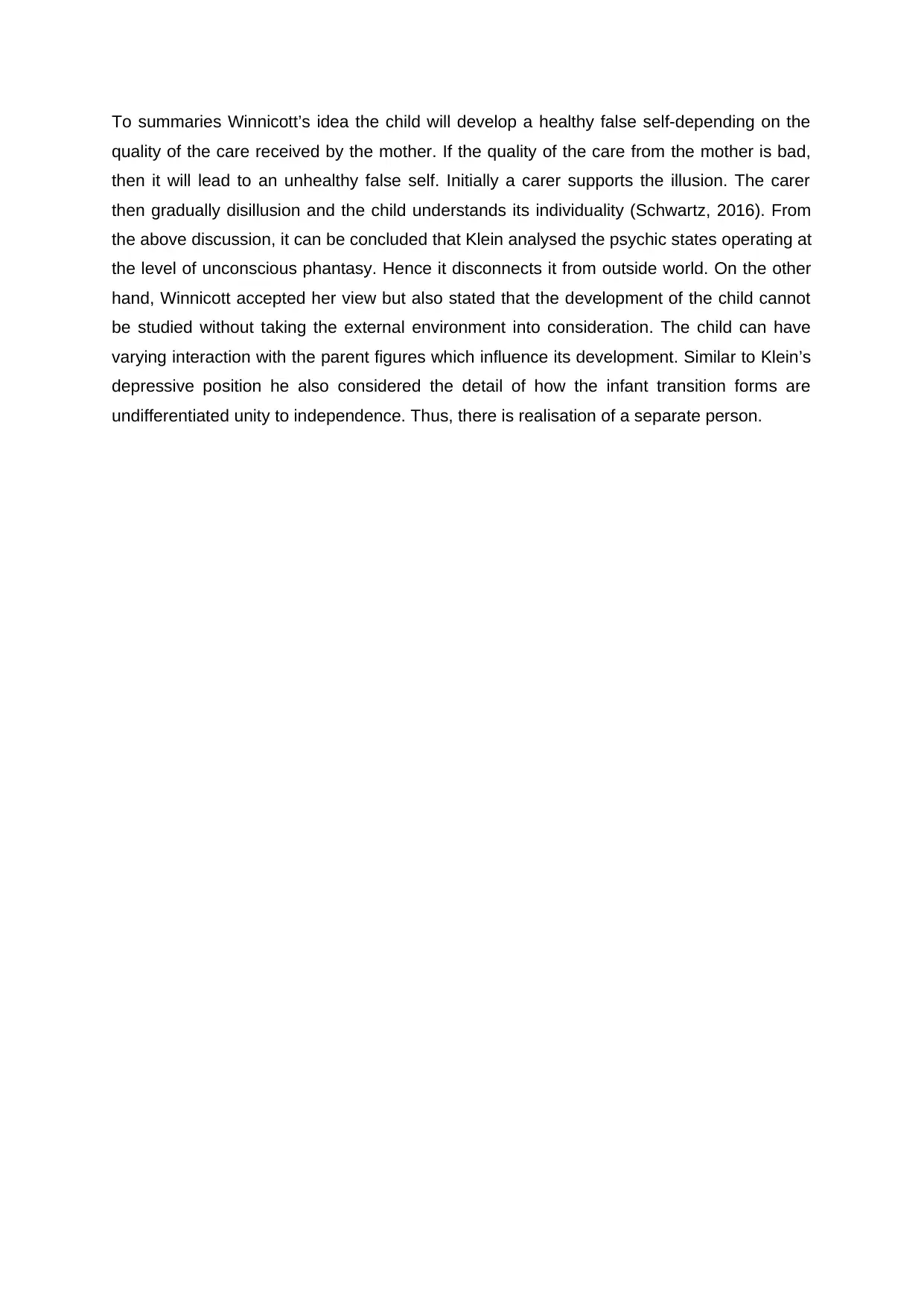
To summaries Winnicott’s idea the child will develop a healthy false self-depending on the
quality of the care received by the mother. If the quality of the care from the mother is bad,
then it will lead to an unhealthy false self. Initially a carer supports the illusion. The carer
then gradually disillusion and the child understands its individuality (Schwartz, 2016). From
the above discussion, it can be concluded that Klein analysed the psychic states operating at
the level of unconscious phantasy. Hence it disconnects it from outside world. On the other
hand, Winnicott accepted her view but also stated that the development of the child cannot
be studied without taking the external environment into consideration. The child can have
varying interaction with the parent figures which influence its development. Similar to Klein’s
depressive position he also considered the detail of how the infant transition forms are
undifferentiated unity to independence. Thus, there is realisation of a separate person.
quality of the care received by the mother. If the quality of the care from the mother is bad,
then it will lead to an unhealthy false self. Initially a carer supports the illusion. The carer
then gradually disillusion and the child understands its individuality (Schwartz, 2016). From
the above discussion, it can be concluded that Klein analysed the psychic states operating at
the level of unconscious phantasy. Hence it disconnects it from outside world. On the other
hand, Winnicott accepted her view but also stated that the development of the child cannot
be studied without taking the external environment into consideration. The child can have
varying interaction with the parent figures which influence its development. Similar to Klein’s
depressive position he also considered the detail of how the infant transition forms are
undifferentiated unity to independence. Thus, there is realisation of a separate person.
Paraphrase This Document
Need a fresh take? Get an instant paraphrase of this document with our AI Paraphraser
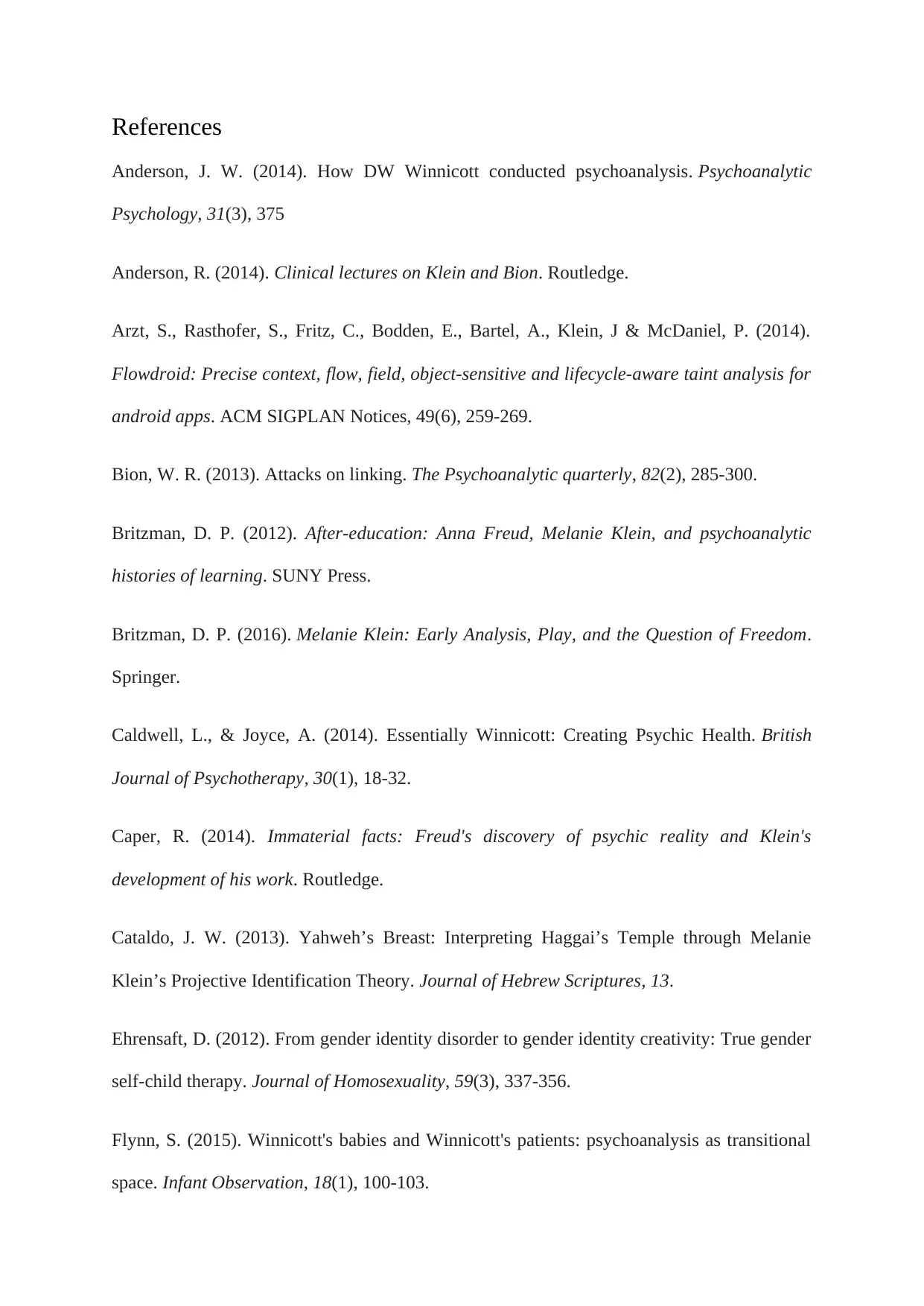
References
Anderson, J. W. (2014). How DW Winnicott conducted psychoanalysis. Psychoanalytic
Psychology, 31(3), 375
Anderson, R. (2014). Clinical lectures on Klein and Bion. Routledge.
Arzt, S., Rasthofer, S., Fritz, C., Bodden, E., Bartel, A., Klein, J & McDaniel, P. (2014).
Flowdroid: Precise context, flow, field, object-sensitive and lifecycle-aware taint analysis for
android apps. ACM SIGPLAN Notices, 49(6), 259-269.
Bion, W. R. (2013). Attacks on linking. The Psychoanalytic quarterly, 82(2), 285-300.
Britzman, D. P. (2012). After-education: Anna Freud, Melanie Klein, and psychoanalytic
histories of learning. SUNY Press.
Britzman, D. P. (2016). Melanie Klein: Early Analysis, Play, and the Question of Freedom.
Springer.
Caldwell, L., & Joyce, A. (2014). Essentially Winnicott: Creating Psychic Health. British
Journal of Psychotherapy, 30(1), 18-32.
Caper, R. (2014). Immaterial facts: Freud's discovery of psychic reality and Klein's
development of his work. Routledge.
Cataldo, J. W. (2013). Yahweh’s Breast: Interpreting Haggai’s Temple through Melanie
Klein’s Projective Identification Theory. Journal of Hebrew Scriptures, 13.
Ehrensaft, D. (2012). From gender identity disorder to gender identity creativity: True gender
self-child therapy. Journal of Homosexuality, 59(3), 337-356.
Flynn, S. (2015). Winnicott's babies and Winnicott's patients: psychoanalysis as transitional
space. Infant Observation, 18(1), 100-103.
Anderson, J. W. (2014). How DW Winnicott conducted psychoanalysis. Psychoanalytic
Psychology, 31(3), 375
Anderson, R. (2014). Clinical lectures on Klein and Bion. Routledge.
Arzt, S., Rasthofer, S., Fritz, C., Bodden, E., Bartel, A., Klein, J & McDaniel, P. (2014).
Flowdroid: Precise context, flow, field, object-sensitive and lifecycle-aware taint analysis for
android apps. ACM SIGPLAN Notices, 49(6), 259-269.
Bion, W. R. (2013). Attacks on linking. The Psychoanalytic quarterly, 82(2), 285-300.
Britzman, D. P. (2012). After-education: Anna Freud, Melanie Klein, and psychoanalytic
histories of learning. SUNY Press.
Britzman, D. P. (2016). Melanie Klein: Early Analysis, Play, and the Question of Freedom.
Springer.
Caldwell, L., & Joyce, A. (2014). Essentially Winnicott: Creating Psychic Health. British
Journal of Psychotherapy, 30(1), 18-32.
Caper, R. (2014). Immaterial facts: Freud's discovery of psychic reality and Klein's
development of his work. Routledge.
Cataldo, J. W. (2013). Yahweh’s Breast: Interpreting Haggai’s Temple through Melanie
Klein’s Projective Identification Theory. Journal of Hebrew Scriptures, 13.
Ehrensaft, D. (2012). From gender identity disorder to gender identity creativity: True gender
self-child therapy. Journal of Homosexuality, 59(3), 337-356.
Flynn, S. (2015). Winnicott's babies and Winnicott's patients: psychoanalysis as transitional
space. Infant Observation, 18(1), 100-103.
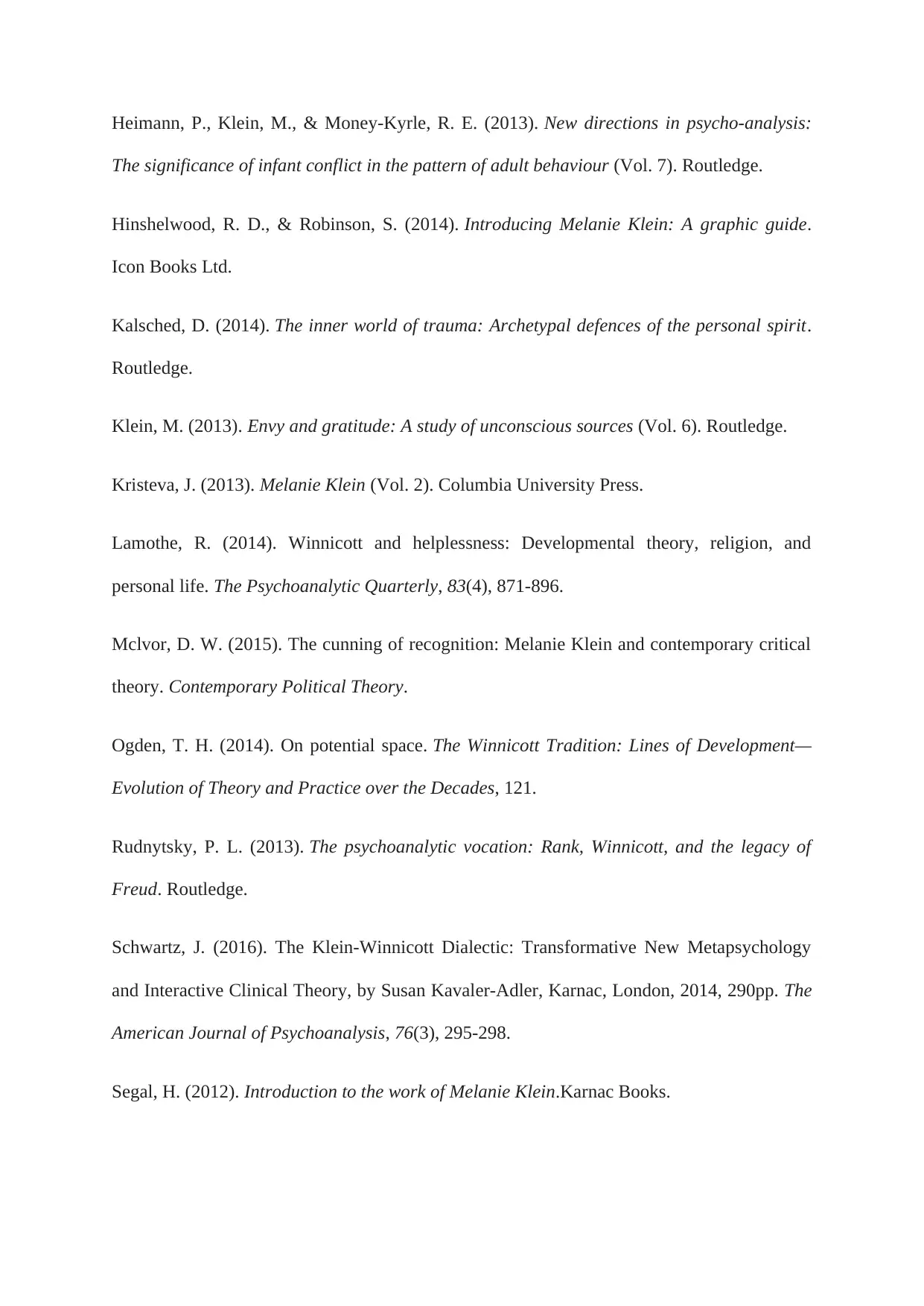
Heimann, P., Klein, M., & Money-Kyrle, R. E. (2013). New directions in psycho-analysis:
The significance of infant conflict in the pattern of adult behaviour (Vol. 7). Routledge.
Hinshelwood, R. D., & Robinson, S. (2014). Introducing Melanie Klein: A graphic guide.
Icon Books Ltd.
Kalsched, D. (2014). The inner world of trauma: Archetypal defences of the personal spirit.
Routledge.
Klein, M. (2013). Envy and gratitude: A study of unconscious sources (Vol. 6). Routledge.
Kristeva, J. (2013). Melanie Klein (Vol. 2). Columbia University Press.
Lamothe, R. (2014). Winnicott and helplessness: Developmental theory, religion, and
personal life. The Psychoanalytic Quarterly, 83(4), 871-896.
Mclvor, D. W. (2015). The cunning of recognition: Melanie Klein and contemporary critical
theory. Contemporary Political Theory.
Ogden, T. H. (2014). On potential space. The Winnicott Tradition: Lines of Development—
Evolution of Theory and Practice over the Decades, 121.
Rudnytsky, P. L. (2013). The psychoanalytic vocation: Rank, Winnicott, and the legacy of
Freud. Routledge.
Schwartz, J. (2016). The Klein-Winnicott Dialectic: Transformative New Metapsychology
and Interactive Clinical Theory, by Susan Kavaler-Adler, Karnac, London, 2014, 290pp. The
American Journal of Psychoanalysis, 76(3), 295-298.
Segal, H. (2012). Introduction to the work of Melanie Klein.Karnac Books.
The significance of infant conflict in the pattern of adult behaviour (Vol. 7). Routledge.
Hinshelwood, R. D., & Robinson, S. (2014). Introducing Melanie Klein: A graphic guide.
Icon Books Ltd.
Kalsched, D. (2014). The inner world of trauma: Archetypal defences of the personal spirit.
Routledge.
Klein, M. (2013). Envy and gratitude: A study of unconscious sources (Vol. 6). Routledge.
Kristeva, J. (2013). Melanie Klein (Vol. 2). Columbia University Press.
Lamothe, R. (2014). Winnicott and helplessness: Developmental theory, religion, and
personal life. The Psychoanalytic Quarterly, 83(4), 871-896.
Mclvor, D. W. (2015). The cunning of recognition: Melanie Klein and contemporary critical
theory. Contemporary Political Theory.
Ogden, T. H. (2014). On potential space. The Winnicott Tradition: Lines of Development—
Evolution of Theory and Practice over the Decades, 121.
Rudnytsky, P. L. (2013). The psychoanalytic vocation: Rank, Winnicott, and the legacy of
Freud. Routledge.
Schwartz, J. (2016). The Klein-Winnicott Dialectic: Transformative New Metapsychology
and Interactive Clinical Theory, by Susan Kavaler-Adler, Karnac, London, 2014, 290pp. The
American Journal of Psychoanalysis, 76(3), 295-298.
Segal, H. (2012). Introduction to the work of Melanie Klein.Karnac Books.
⊘ This is a preview!⊘
Do you want full access?
Subscribe today to unlock all pages.

Trusted by 1+ million students worldwide
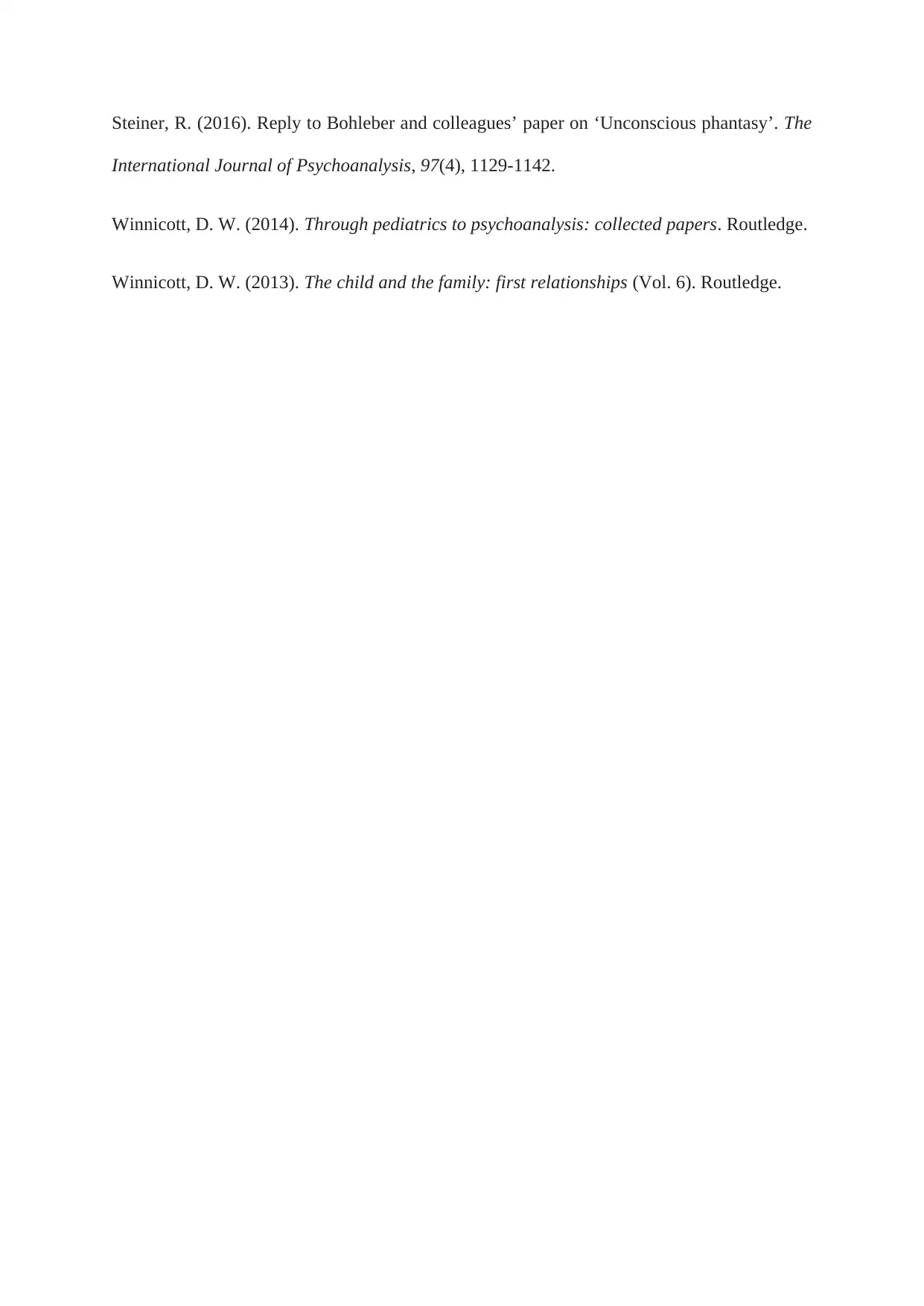
Steiner, R. (2016). Reply to Bohleber and colleagues’ paper on ‘Unconscious phantasy’. The
International Journal of Psychoanalysis, 97(4), 1129-1142.
Winnicott, D. W. (2014). Through pediatrics to psychoanalysis: collected papers. Routledge.
Winnicott, D. W. (2013). The child and the family: first relationships (Vol. 6). Routledge.
International Journal of Psychoanalysis, 97(4), 1129-1142.
Winnicott, D. W. (2014). Through pediatrics to psychoanalysis: collected papers. Routledge.
Winnicott, D. W. (2013). The child and the family: first relationships (Vol. 6). Routledge.
1 out of 10
Related Documents
Your All-in-One AI-Powered Toolkit for Academic Success.
+13062052269
info@desklib.com
Available 24*7 on WhatsApp / Email
![[object Object]](/_next/static/media/star-bottom.7253800d.svg)
Unlock your academic potential
Copyright © 2020–2025 A2Z Services. All Rights Reserved. Developed and managed by ZUCOL.





